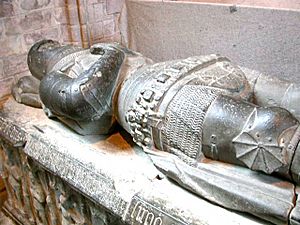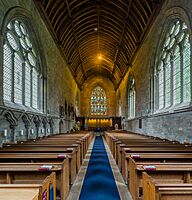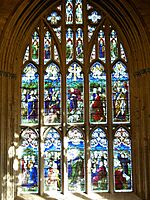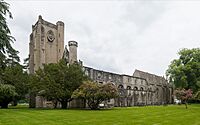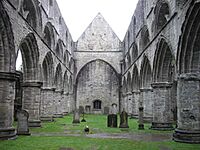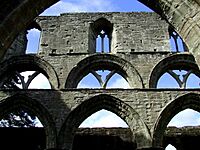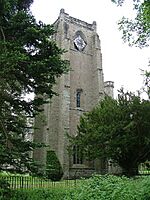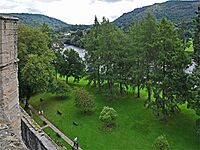Dunkeld Cathedral facts for kids
Quick facts for kids Dunkeld Cathedral |
|
|---|---|
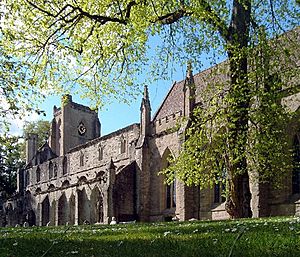 |
|
| Location | Dunkeld, Perth and Kinross |
| Country | Scotland |
| Denomination | Church of Scotland |
| Previous denomination | Roman Catholic |
| History | |
| Founded | 1260 |
| Dedication | St Columba |
| Architecture | |
| Heritage designation | Scheduled monument |
| Designated | 10 October 1994 |
| Administration | |
| Diocese | Diocese of Dunkeld (historic) |
| Presbytery | Dunkeld and Meigle |
Dunkeld Cathedral is a historic church in Dunkeld, Scotland. It sits by the River Tay in Perth and Kinross. This beautiful building is made mostly of grey sandstone. Its construction started in 1260 and finished in 1501.
The cathedral was built where an old monastery once stood. This monastery was home to the Culdee monks. You can still see some reddish stones from the old monastery in the eastern wall. Even though it's called a 'cathedral', the Church of Scotland doesn't have bishops or cathedrals today. However, many old churches like this one still keep the name.
Contents
Exploring Dunkeld Cathedral's Past
Because it took so long to build, Dunkeld Cathedral shows different styles of architecture. You can see both Gothic and Norman designs mixed together. Gothic style often has tall arches and big windows. Norman style uses rounder arches and thick walls.
Even though parts of the cathedral are now ruins, it is still used regularly. It is also open for people to visit.
Ancient Relics and Monks
People believed that important items from Saint Columba were kept at Dunkeld. These included his bones. They were moved to Ireland during the Scottish Reformation. This was a time when Scotland changed its main church. Some people think there might still be more of Saint Columba's relics hidden in the cathedral grounds.
The first monastery at Dunkeld was very old. It was built around the 6th or 7th century. It started as simple huts made of wood and mud. Later, in the 9th century, a king named Causantín mac Fergusa built a stronger cathedral. He made Dunkeld the most important religious center in Alba (an old name for Scotland).
An old Celtic bell from the monastery is not in the cathedral today. It is kept in the Little Dunkeld Church nearby. Some think this is because later church leaders did not agree with the Culdee monks' beliefs.
Royal Connections and Battles
In the 17th century, the church leadership of Dunkeld became linked to the Scottish Crown. Later, it passed to the Earls of Fife. Today, Dunkeld Cathedral is owned by the Crown. It is looked after by Historic Environment Scotland. It is also a scheduled monument, which means it is a very important historic site.
A famous battle happened around the cathedral in 1689. This was the Battle of Dunkeld. It was fought between Jacobite Highland clans and government soldiers. The Jacobites supported King James II and VII. He had lost his throne the year before. The government forces supported King William III and II. The government side won the battle.
Dunkeld Cathedral Today
Dunkeld Cathedral is still the local Church of Scotland parish church. Services are held there every Sunday. During the colder winter months, the church community uses the smaller "Little Dunkeld" Church. The current minister, Reverend R. Fraser Penny, has served since 2001.
Inside the cathedral, there is a small museum. It is called the Chapter House Museum. It displays items from the monastery's past. You can also see things from the Middle Ages and learn about local history.
Notable Burials at the Cathedral
Many important people are buried at Dunkeld Cathedral. One famous person is Alexander Stewart, Earl of Buchan. He was known as "the Wolf of Badenoch". He was buried here after he died in 1394. You can still see his tomb inside the cathedral. It has a statue of him wearing his armor.
Other important people buried here include:
- John Scotus, a bishop who lived from 1183 to 1203.
- Richard de Inverkeithing, a royal official and bishop (1250–1272).
- William Sinclair, another bishop of Dunkeld (1309–1337).
- The 1st Earl of Atholl (c. 1440–1512).
- Charles Edward Stuart, Count Roehenstart (1784–1854).
Gallery
See also
 | Sharif Bey |
 | Hale Woodruff |
 | Richmond Barthé |
 | Purvis Young |


